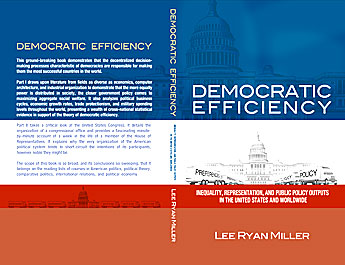|
Democratic
Efficiency
Inequality,
Representation, And Public Policy Outputs
In The United States And Worldwide
ISBN: 1-4184-0162-5
|
LEE'S
NEW BOOK
Teaching
Amidst the
Neon Palm Trees

Click
Here.
"A
SHOCKING INDICTMENT
OF OUR SYSTEM OF HIGHER
EDUCATION AND THE
POLITICS
THAT PERMEATE IT."
~ Nevada
State Senator,
Raymond Shaffer
|

This ground-breaking book demonstrates that
the decentralized decision-making processes characteristic of
democracies are responsible for making them the most successful
countries in the world.
Part I draws upon literature from fields as
diverse as economics, computer architecture, and industrial
organization to demonstrate that the more equally power is
distributed in society, the closer government policy comes to
maximizing aggregate social welfare. It also analyzes political
business cycles, economic growth rates, trade protectionism, and
military spending levels throughout the world, presenting a wealth
of cross-national statistical evidence in support of the theory of
democratic efficiency.
Part II takes a critical look at the United
States Congress. It details the organization of a congressional
office and provides a fascinating minute-by-minute account of a week
in the life of a member of the House of Representatives. It explains
why the very organization of the American political system tends to
short-circuit the intentions of its participants, however noble they
might be.
The scope of this book is so broad, and its
conclusions so sweeping, that it belongs on the reading lists of
courses in American politics, political theory, comparative
politics, international relations, and political economy.
|



